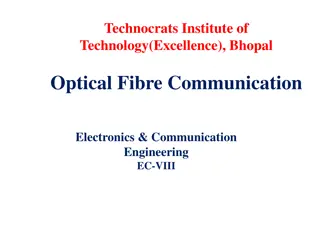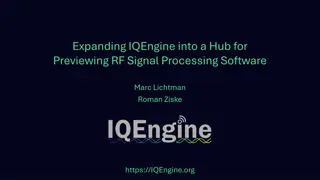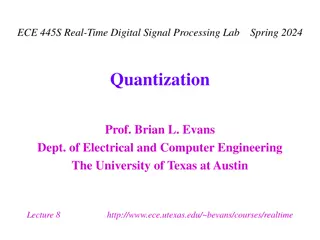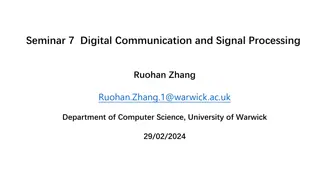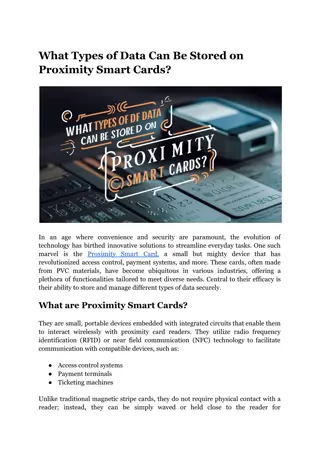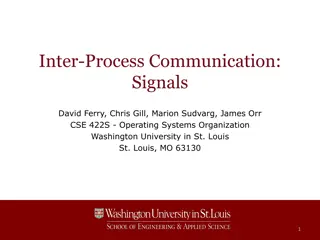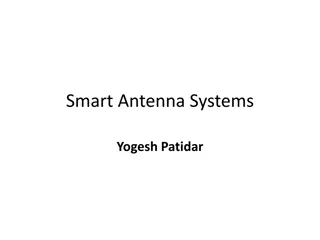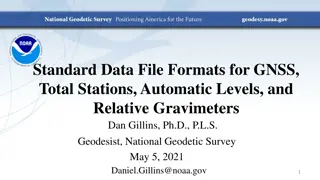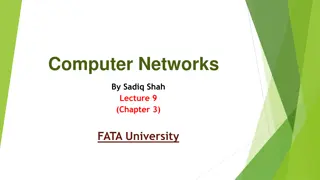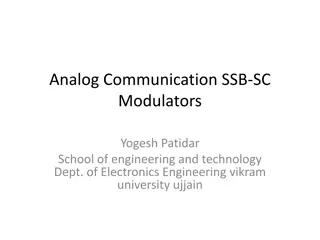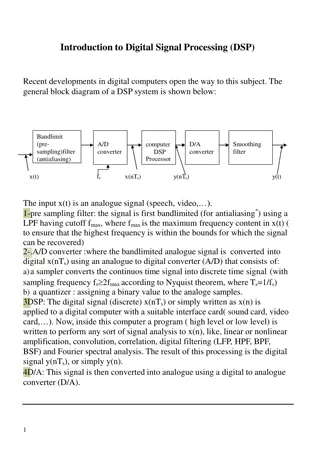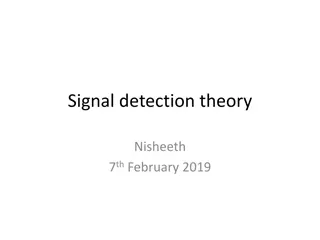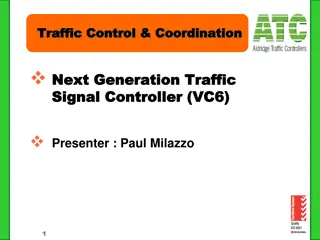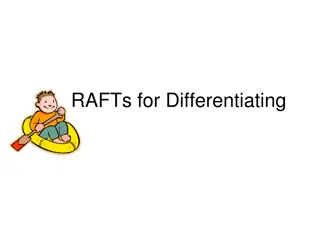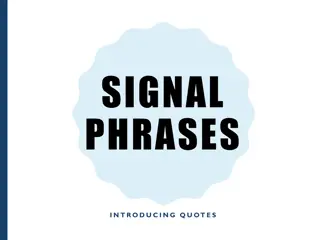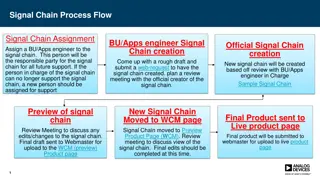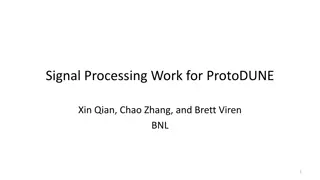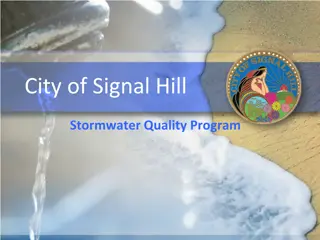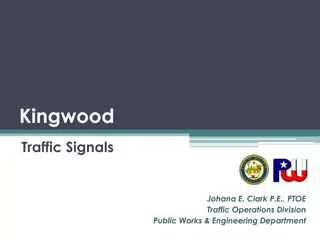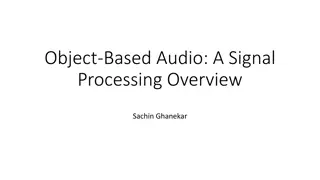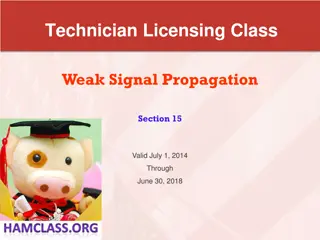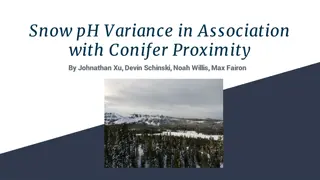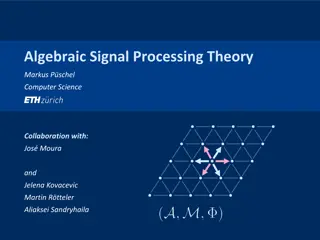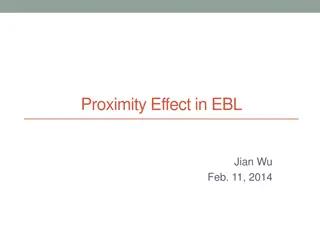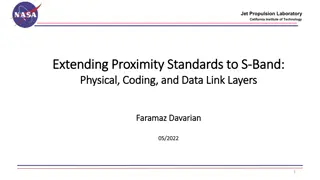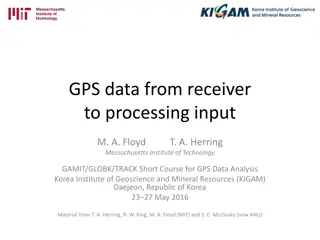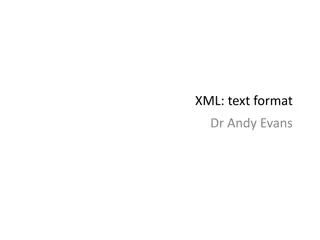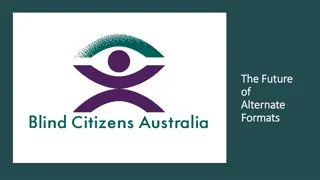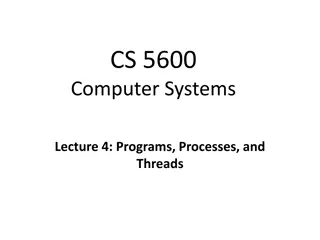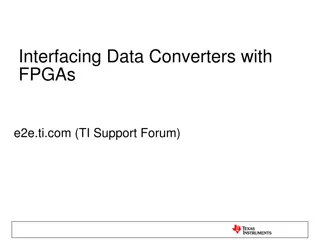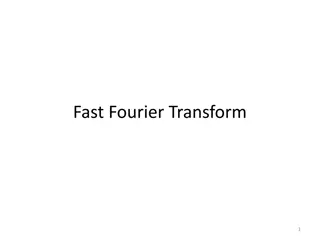Understanding Data Acquisition and Instrument Interface
In the realm of data acquisition and instrument interface, various components come together to sense physical variables, condition electrical signals, convert analog to digital data, and analyze the acquired information. This process involves transducers, signal analysis, instrument automation, and
4 views • 54 slides
Understanding Interpolation and Pulse Shaping in Real-Time Digital Signal Processing
Discrete-to-continuous conversion, interpolation, pulse shaping techniques, and data conversion in real-time digital signal processing are discussed in this content. Topics include types of pulse shapes, sampling, continuous signal approximation, interpolation methods, and data conversion processes
4 views • 14 slides
Understanding Optical Fiber Signal Degradation in Communication Engineering
Technocrats Institute of Technology (Excellence) in Bhopal delves into the concepts of signal degradation in optical fiber communication, focusing on attenuation, distortion mechanisms, and measurement techniques. The institute emphasizes the importance of signal attenuation and its impact on inform
6 views • 56 slides
Expanding IQEngine: A Hub for Previewing RF Signal Processing Software
IQEngine is evolving into a versatile hub where users can manage, analyze, process, and share RF signal recordings directly in their browser. Built on an open standard, IQEngine stores data such as sample rate, center frequency, and IQ data type to prevent data degradation. Frontend powered by React
7 views • 22 slides
Real-Time Digital Signal Processing Lab: Quantization and Resolution Overview
Explore quantization and resolution techniques in real-time digital signal processing. Topics include quantization error analysis, total harmonic distortion, noise immunity in communication systems, human sensory resolution, analog-to-digital conversion, and uniform amplitude quantization. Dive into
7 views • 19 slides
Seminar 7 Digital Communication and Signal Processing
Learn how to design a second order ARMA filter to suppress sinusoidal disturbances in a signal while preserving the original signal. The process involves deriving the transfer function, determining coefficients, and sketching a block diagram representation of the filter.
0 views • 7 slides
What Types of Data Can Be Stored on Proximity Smart Cards_ What Types of Data Can Be Stored on Proximity Smart Cards
Unsure what data proximity cards hold? Explore common types of information stored on these contactless cards and their security features.
1 views • 4 slides
Understanding Inter-Process Communication Signals in Operating Systems
Signals in inter-process communication are asynchronous notifications delivered to specific processes, allowing event-based programming. Processes can handle signal delivery by ignoring it, terminating, or invoking a signal handler. Signal handlers can be written in two ways - one handler for many s
0 views • 21 slides
Smart Antenna Systems Overview: Enhancing Wireless Performance
Smart antenna systems, like adaptive array antennas and switched beam antennas, combine antenna arrays with digital signal processing to transmit and receive signals adaptively. These systems improve signal quality, reduce interference, and increase capacity by dynamically adjusting radiation patter
0 views • 20 slides
Standard Data File Formats for Geospatial Instruments
Understanding the importance of standard file formats for GNSS, total stations, automatic levels, and relative gravimeters to facilitate data exchange, processing, and preservation in the geospatial industry. Exploring the significance of RINEX and other XML-based formats, along with examples and th
2 views • 30 slides
Understanding Transmission Impairments in Computer Networks
Signals traveling through transmission media in computer networks can experience attenuation, distortion, and noise, leading to signal loss and changes in form or shape. Attenuation results in energy loss requiring amplification, while distortion alters the signal's composition. Engineers use decibe
1 views • 12 slides
Understanding SSB-SC Modulation in Analog Communication
Single Sideband Suppressed Carrier (SSB-SC) modulation is a technique in analog communication that transmits a single sideband along with the carrier signal, offering advantages such as reduced bandwidth consumption, increased signal transmission capacity, and lower noise interference. However, the
0 views • 9 slides
Overview of Digital Signal Processing (DSP) Systems and Implementations
Recent advancements in digital computers have paved the way for Digital Signal Processing (DSP). The DSP system involves bandlimiting, A/D conversion, DSP processing, D/A conversion, and smoothing filtering. This system enables the conversion of analog signals to digital, processing using digital co
1 views • 24 slides
Understanding Signal Detection Theory in Psychophysics
Signal Detection Theory in psychophysics quantifies how observers respond to signals in noise. It involves mathematical models like psychometric functions to measure bias and sensitivity in detecting stimuli. Key concepts include sensitivity and criterion in distinguishing signal perception and repo
6 views • 24 slides
Traffic Control and Coordination: Next Generation Signal Controller Overview
Explore the evolution of traffic signal controllers in Australia, from VC5 to VC6, along with the software integration and system overview. Learn about the hardware configurations and capabilities of the latest TSC/4 controllers, including signal group monitoring and conflict capabilities. The new g
4 views • 10 slides
Differentiated RAFT Strategies for Engaging Writing Across the Curriculum
RAFTs, an engaging high-level strategy, encourage students to assume roles, consider audiences, write in specific formats, and explore topics. This method motivates students by offering choice and aligning with their interests and learning profiles. Differentiating RAFTs by readiness involves assign
0 views • 15 slides
Mastering the Art of Introducing Quotes with Signal Phrases
Understanding the importance of signal phrases in academic writing. Signal phrases provide context, establish credibility of sources, and prevent dropped quotes. Learn the key elements required for an effective signal phrase and how to structure them using different formulas. Enhance your writing by
1 views • 16 slides
Developing and Managing Signal Chains for Future Support
Create a system to assign a responsible person for signal chains, initiate the chain creation process, review and finalize the signal chain, and move it to the live product page. Guidelines include color codes for blocks, assigning part numbers to each block, and adding images to the signal chain.
1 views • 4 slides
Advancements in Signal Processing for ProtoDUNE Experiment
The team, including Xin Qian, Chao Zhang, and Brett Viren from BNL, leverages past experience in MicroBooNE to outline a comprehensive work plan for signal processing in ProtoDUNE. Their focus includes managing excess noise, addressing non-functional channels, and evolving signal processing techniqu
1 views • 23 slides
Comprehensive Training Package on Active Tuberculosis Drug Safety Monitoring and Management (aDSM) 2023
This training package focuses on signal detection in active tuberculosis drug safety monitoring. It covers the main aims and principles of signal detection, completion of safety profiles for new TB drugs and regimens, definition of signal, continuous reporting activities, construction of risk profil
5 views • 15 slides
City of Signal Hill Stormwater Quality Program Overview
The City of Signal Hill, known for its unique geographic characteristics and historical oil production legacy, is proactive in implementing stormwater quality programs. The city addresses MS4 and TMDL requirements, demonstrating regional leadership in environmental initiatives. With a population of
1 views • 42 slides
Kingwood Traffic Signals Overview and Updates
Traffic operations in Kingwood, managed by Johana E. Clark, P.E., include signal system improvements and updates. Recent changes involve signal removal studies, new signal installations, and upgrades at key intersections to enhance traffic flow and safety. The system's capacity and daily traffic vol
1 views • 11 slides
Understanding Object-Based Audio Processing
Explore the evolution and key concepts of object-based audio processing, including signal processing on headphones and immersive speaker layouts. Dive into the history of digital audio, audio signal parameters, and the progression of audio technologies from PCM to immersive multi-channel formats for
0 views • 34 slides
Understanding Weak Signal Propagation in Radio Waves
This informative content delves into weak signal propagation and its various aspects related to electromagnetic waves, particularly in the context of radio communication. It covers topics such as radio waves, radio horizon, knife-edge diffraction, tropospheric scatter mode, auroral reflection, and m
1 views • 37 slides
Example of COI Disclosure Formats in Academic Presentations
These images provide examples of Conflict of Interest (COI) disclosure formats for oral and poster presentations in academic settings. They outline how authors can disclose any potential COIs in relation to their work over the past three years, including details on employment, stock ownership, paten
1 views • 4 slides
Snow pH Variance in Relation to Conifer Proximity Study
Investigating the impact of conifer proximity on snow pH and melting rates, this study hypothesized that closer proximity to trees would result in lower pH levels and slower melting. By analyzing snow samples from varying distances around conifer trees and conducting experiments, the study confirmed
0 views • 11 slides
Carnegie Mellon Algebraic Signal Processing Theory Overview
Carnegie Mellon University is at the forefront of Algebraic Signal Processing Theory, focusing on linear signal processing in the discrete domain. Their research covers concepts such as z-transform, C-transform, Fourier transform, and various signal models and filters. The key concept lies in the al
2 views • 40 slides
Understanding Proximity Effect in Electron Beam Lithography
Explore the impact of proximity effect in EBL, its causes, and its effects on resolution. Learn about physical models, reduction techniques, and correction methods to mitigate proximity effect and enhance lithographic precision.
0 views • 11 slides
Developing Lunar Proximity Standards for Enhanced Communication
Various commercial lunar relay systems are in development, emphasizing the urgent need for standardizing proximity signal formats for efficient communication between lunar payloads. Extending the current CCSDS Proximity-1 Standard to the S-band for the Moon is crucial due to differences in frequency
0 views • 10 slides
THVD8000 Line Driver for AC Line PLC Bench Setup
Explore the setup of THVD8000 line driver for AC line PLC, including transmitting and receiving paths, signal flow, power distribution, and components involved. Follow the signal path from THVD8000EVM to AFE031 boostpack, transformer, HV capacitor, and UCC28880EVM. Understand the power flow from AC
0 views • 11 slides
Understanding GPS Data Processing and RINEX Formats
Learn about the process of transferring GPS data from receivers to processing input, the importance of RINEX formats for universal data exchange, different raw data formats, motivation behind RINEX development, and details about RINEX versions. Explore RINEX 2 data format, its file naming convention
0 views • 13 slides
Evolution of Data Formats in Information Technology
Over time, as data space became more affordable, there has been a shift towards text-based data formats in information technology. This evolution has led to a transition from binary formats to text, making data more understandable for both humans and coders. The move to open data formats, based on i
0 views • 19 slides
Evolution of Formats: Past, Present, and Future
Explore the transition of formats from cassette tapes to digital media, with insights on format preferences from 1997 to 2022. Learn about the changing landscape of alternate formats and the digital future. Contact Sally Aurisch, the CEO of Blind Citizens Australia, for more information.
0 views • 6 slides
Understanding Programs, Processes, and Threads in Computer Systems
In this comprehensive guide, we delve into the fundamental concepts of programs, processes, and threads in computer systems. Exploring topics such as dynamic code execution, program formats, and the execution of .exe files, we uncover the intricate workings of how software is executed and managed by
0 views • 110 slides
Understanding GIF and file formats in computer graphics
GIF and file formats play a crucial role in computer graphics, defining the structure of images and animations. GIF files consist of a logical screen populated with images or frames, while file formats are divided into segments containing images, extension blocks, and trailers. Extension blocks in G
0 views • 6 slides
Business Letter Writing Guidelines and Formats
Learn about the essential parts of a business letter, including the heading, addressee, subject, salutation, body paragraphs, complimentary close, and signature. Understand various formats/styles such as block, modified block, and semi-block. Discover sample formats and guidelines for writing effect
0 views • 23 slides
FPGA Data Converter Interfacing Overview
Explore various I/O formats for interfacing data converters with FPGAs, including ADC parallel and serial formats like CMOS, LVDS, DDR. Learn about clock edge alignment, parallel, and true serial formats. Understand the differences between SDR and DDR, as well as considerations for clocking and data
0 views • 32 slides
Debate Formats Explained: CX vs. LD
Explore the world of debate with an overview of the CX (Cross-Examination) and LD (Lincoln-Douglas) formats. CX involves policy debates with teams advocating for and against resolutions related to US federal government policies, while LD focuses on one-on-one debates on values and philosophy. Discov
0 views • 11 slides
Understanding Inter-Process Communication Signals in Operating Systems
Signals in operating systems play a critical role in facilitating asynchronous notifications between processes. They allow for event-based programming and are conceptually similar to hardware interrupts and exceptions. Processes can handle signal delivery by ignoring it, terminating, or invoking a s
0 views • 24 slides
Understanding Fast Fourier Transform (FFT) in Signal Processing
Fast Fourier Transform (FFT) is a powerful algorithm used in signal processing to efficiently calculate the Discrete Fourier Transform (DFT). This advanced technique leverages symmetry and periodicity properties to reduce computational complexity, making it a key tool in digital signal analysis. By
0 views • 14 slides


